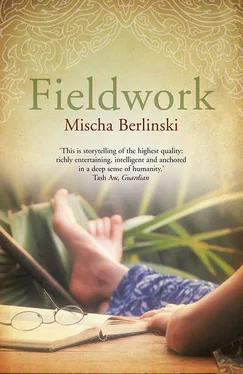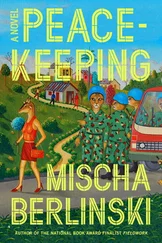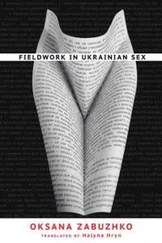And so Raymond found himself standing on those hillsides in Tibet and China and the Dyalo country, staring out at the weathered tribal faces. What hard lives these gentle people faced! He had come, he told them, to tell them the terrible Good News: that they would be judged soon, and judged hard, but judged by a God who delighted to love them and help them. He had come as fast as he could with his wife and his children from the white man's land to tell them to take precautions: the river of time was rising, and their homes would soon be flooded, and their rice fields washed away. But there was a way out, Raymond Walker added. He could lead them to the high ground.
It is an unfortunate fact which every traveler eventually comes to know, but there is no place in this world so exotic, so remote, or so beautiful that boredom does not eventually set in; and the Walkers after two years in Bantang, which although exotic and remote was not beautiful, were bored.
The death of the MacLyons had been a hard blow for the young couple: the MacLyons had been of the Walkers' generation, and the four young missionaries had been great friends, a buoyant counterweight to the staid gravity of the older Chesters. At night, Mary MacLyon had brought out a harmonica and Stan MacLyon a banjo, and the foursome had stomped and hooted their way through a hundred familiar tunes, whereas the Chesters retired early to bed. From the moment the Walkers arrived in Bantang, Stan and Raymond had started to plan an evangelizing tour into the mountain villages, while Mary and Laura discussed re-painting the interior of the gloomy Mission. The foursome had taken to eating their meals together late at night by the light of wax candles, and although the Chesters were, of course, invited to eat with them, the invitation was inevitably declined on account of Dr. Chester's indigestion should he dine late. Stan and Mary were the sort always willing to tell another joke, or stay up an hour longer, or put together a skit, or bring home strangers they found on the streets of Bantang. After Thomas was born, Mary insisted on waking up with the baby as often as Raymond and Laura; Mrs. Chester, by contrast, had no particular skill in dandling a baby, and Thomas tended to cry when she walked into the room. When the MacLyons prayed, they rocked on the balls of their feet, and shouted and wept; they closed the Bible after daily readings bathed in a sheen of sweat. Stan had an odd and wonderful gift: he could see the faces of Old Testament characters in the faces of the people of Bantang. The dissolute tax collector with his anxious hooded eyes fingering his official seal was crazy old Saul playing with his javelin, once Stan MacLyon pointed it out. The Walkers found Stan and Mary's wild, passionate, mystical faith exhilarating.
When the Chesters prayed, on the other hand, it was a sober thing: Dr. Chester read passages from Scripture, Mrs. Chester said "Amen," and Dr. Chester in his meticulous way gave commentary. The Chesters of course were wonderful missionaries, but they had been manning this particular Mission Station now for almost thirty years. In their youth, they had had great adventures: as a young man, Mr. Chester had dreamed that he would live his life on muleback, spreading the Gospel, his wife on another mule, their worldly possessions on a third. Mrs. Chester had been wooed by this dream, and for many years they had so lived. Dr. Chester had explained the Gospel to the Dalai Lama himself, and Mrs. Chester had raised four children in this inhospitable and almost savage country, of whom three survived. After Mrs. Chester broke her hip, the Chesters had established the permanent Mission Station at Bantang, and nursed the station through famine, revolution, and civil war. In their day, they had seen two dozen young missionaries come and go through Bantang station, every single one of them devoted Christians, and the Chesters had come to realize that success as a missionary was not so much a question of exuberance as endurance. Sometimes they found themselves slightly wearied by the young people. Something of the mentality of the Chinese Mandarin had worn off on them: Dr. Chester admitted that he was less eager to proselytize as he grew older, although no less eager to see his faith spread, and Mrs. Chester, on her last home furlough, had shocked the ladies of a number of midwestern Christian congregations by saying that in her humble opinion, if lacking, of course, the grandeur of the Christian faith, Tibetan Buddhism nevertheless seemed to contain a number of truths. Dr. Chester looked forward to the completion of his translation of the Bible into Tibetan, which he had promised the Dalai Lama he would personally present to His Holiness in Lhassa, and he harbored a secret hope, a new dream for his old age: that in exchange for this great labor, the Dalai Lama would allow the Chesters to remain as permanent guests in the interior of Tibet. This would be their retirement, which they would pass together in dignified conversation with the Buddhist monks about the meaning of the universe.
The Walkers and MacLyons all had noted how remarkably affectionate the Chesters were. Dr. Chester was silver-haired, with a neatly trimmed silver mustache and round cheeks which turned red in the mountain cold; talking to Laura, Mrs. Chester more than once confessed herself guilty of the sin of pride when she considered her good fortune in being the possessor of this still-handsome man. Mrs. Chester dressed only in the dreariest of black dresses, which covered her completely from her thick neck to her heavy ankles, and yet she never appeared in public in season without the fresh gardenia or lotus in her lapel that Mr. Chester had picked for her that very morning from the flowery little garden he tended behind the Mission. After forty years of marriage, the Chesters still wandered the small city hand in hand, Mrs. Chester's fine hand reaching out of her long robes to find Dr. Chester's heavy paw. Holding hands was considered mildly vulgar in Chinese eyes, but neither member of the couple was willing to forgo this innocent pleasure simply to placate local custom. The Chesters were content chiefly with each other's company: if the stories Dr. Chester repetitively told bored the younger missionaries of the station, in Mrs. Chester's eyes there was no more thrilling raconteur than her husband; and Dr. Chester was deaf to any audience's stifled yawns when his wife pressed him, Morris, please , to continue.
The Walkers had been in Bantang a year when the MacLyons died of typhoid, one after the other, the onset of Mary's illness and Stan's death only three weeks apart. They were buried under matched head-stones which read: gone for the glory of christ.
Now the late-night meals by wax candle ended. Everyone agreed that it made more sense to eat together at a reasonable hour; and Laura Walker gave up her attempts to redecorate the Mission, as Raymond was blind to her improvements — the improvised curtains she had sewn from Chinese silk, the fresh vases of lilies and Tibetan roses she set out — and Mrs. Chester was wholly uninterested in her suggestions: having lived in this clay house now so very many years, she declared that she saw little reason to change it. During the long voyage to Bantang and the first year in the Mission, Dr. Chester's lectures on Tibetan life and customs had fascinated the Walkers, but after eighteen months, the Walkers noticed that Dr. Chester had begun to repeat himself. More than once he had talked about the particular way in which a single Tibetan woman might be married at once to several brothers, and more than once Mrs. Chester had made the same mild joke, "Dr. Chester, I should certainly not have liked being married to your brothers. That is more than a woman deserves." Laura wondered more than once if she needed to chuckle again. The evenings at the Mission Station grew intolerably long. Dr. Chester for his relaxation read from his pile of musical scores, but when Laura begged him actually to make music, he replied that unless there was a symphony orchestra handy, he was lacking an instrument. Dr. Chester found his own joke intolerably droll. Mrs. Chester was the type of woman who enjoyed novels, which she read slowly and thoughtfully, and then passed on to Laura, who despite her most valiant efforts simply could not see the attraction of the medium: she could never persuade herself that the comings and goings of imaginary characters were worthy of her attention.
Читать дальше












